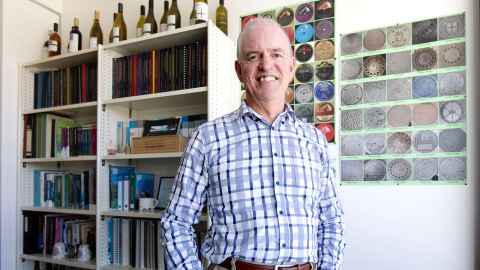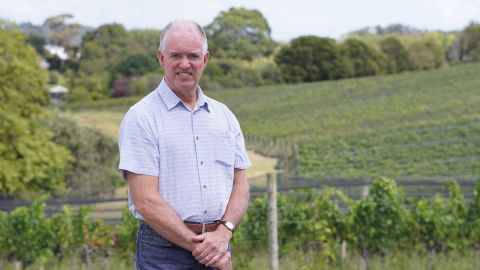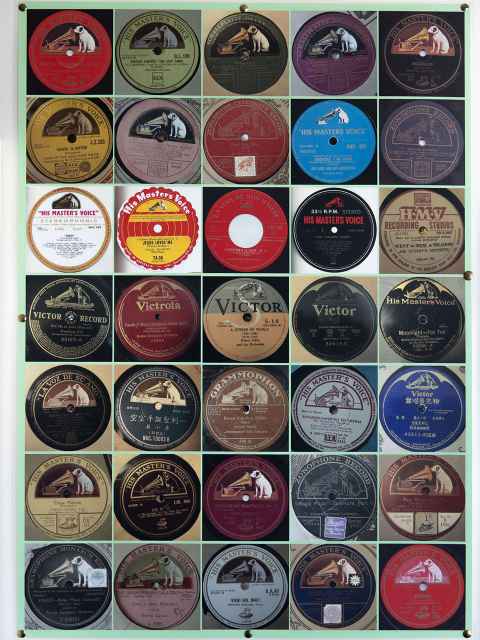Paul Kilmartin: hitting the marc to reuse wine waste
2 May 2024
From wine to LPs, Professor Paul Kilmartin sees the impact of chemistry everywhere.

In 2003, when a postgraduate Wine Science Programme was being planned at the University’s Tāmaki campus, being in the right place at the right time meant Professor Paul Kilmartin ended up with the gig.
“They had advertised for a professor and got some really good applicants – in fact, two outstanding ones. They spent several months negotiating and both turned it down!
“The Dean of Science, Dick Bellamy, turned to me and said, ‘Well, we’ve got everything in place. Would you help us to get it going?’
“I jumped at the opportunity even though I was quite a junior staff member at that stage.”
The rest, as they say, is history. The wine science research and teaching was conducted at Tāmaki for around a decade. Then the owners of Goldwater Estate on Waiheke offered the University the option to move its operations there.
“We think they liked what we were doing in training wine science students, and they wanted to give back to the industry.”
Now the University trains up to 15 postgrads a year at the Goldwater Wine Science Centre. It also runs an undergraduate general interest wine science paper twice a year with around 90 students.
Paul doesn’t lead the programme any more but is very involved. He is leading a research programme creating high-value products from wine waste. Grape marc – the stems, skins and seeds left over from winemaking – is being transformed into food, paper, pharmaceutical, building and chemical products. The Ministry of Business, Innovation and Employment’s Endeavour Fund awarded Paul’s research team (which includes researchers from AUT, Crown Research Institute Scion and the University of Canterbury) $9.8m over five years in 2023.

Paul is a professor of chemical sciences whose specialist field is electrochemistry. He says that nicely complements wine science.
“Wine ageing is about oxidation-reduction chemistry.," he says.
Over the years, he has provided the wine industry with scientific intel on the influences that improve the flavours of Sauvignon Blanc and Pinot Noir. He says if he had been smarter, he might have worked out a way to be “a bit more entrepreneurial” about his discoveries, but has no regrets.
Paul was drawn to chemistry at an early age, largely because of a desire to understand the world from a mathematical, physical and biological perspective. That even extended to understanding the electrochemical process needed to make the stampers for pressing the masters of vinyl records.
“To get the sound right, the grooves on the record have to be really accurate from the wax master where they originally make the recorded sound … it shows how fine-tuned electrochemistry has to be because you are copying across sound waves.”
He has plenty of albums to assess – about 6,000 LPs and 78s, most inherited from his father who worked for HMV.
“I thought I’d get rid of them, but then I found this marvellous collection of labels going back to the 1890s. They convey some of the history of the gramophone record.”
Music is a thing. He plays piano and inherited the grand piano and those 100 apple cases of records from the family home in Nelson, where he grew up on an apple orchard.
He was born in Dunedin, grew up in Nelson, then boarded at St Pat’s Silverstream in Wellington before heading to Greenmeadows Marist seminary in Hawke’s Bay. It was sited on a vineyard, now known as the Mission Estate.
“There were around 50-60 of us there, and it was a fantastic operation. We put on musicals, played touch rugby, it was a great experience. But by 1990, there were just four of us.”
Paul also left but has maintained many friendships and an interest in wine and chemistry. He taught chemistry for two years in high school before starting his PhD at Auckland in 1993. He has been at the University ever since.
Growing up, he has said he didn’t “feel Māori” (he’s Ngāi Tahu, Irish/English and descended from the McLeod clan in Scotland), but in recent years, he has relished being involved in mātauranga Māori and Science.
Given that he’s Māori and a scientist, he gave feedback on the NCEA Science curriculum in 2022 before its introduction this year. Two terms – ‘whakapapa’ and ‘mauri’ – had caused angst for the biologists and chemists contributing to the curriculum.
“But there’s actually been a lot of interest in how mātauranga Māori relates to chemistry.”
He says care is needed in how concepts like mauri are used within science.
“We regularly talk about the life-supporting capacity of rivers, the health of rivers and waterways and the chemical reactions that affect waterways. But in the draft NCEA they had brought in other definitions of mauri that were inconsistent with chemistry, so it was removed.
“Another example connecting science and mātauranga Māori might be investigating something like the museum items (taonga) made of harakeke (flax) – there’s acid/base processes associated with their degradation.”

Paul’s faith is still important and he draws parallels between it and mātauranga Māori.
“I taught Year 13 chemistry, Year 12 maths and religious studies at St Bede’s in Christchurch. In the religious studies classes, you sometimes stood back and asked, ‘Where does science fit into things?’ I remain very interested in the interplay of belief systems and people’s culture, and how these relate to advances in modern sciences.”
Paul has a busy diary, but you won’t find it on his Outlook calendar. He’s still using a little paper book to keep track of things. Don’t ask for his mobile number either. He has never had a cellphone.
“But I’m quick to respond by email,” he says. “My aim every day is to clear my inbox and remove things because then they’re done.”
He admits it has become difficult without a cellphone because there are many authenticating processes that need one, but for Authy he uses a token. “It has become a stubbornness on my part,” he admits. “But when I leave the office I want to be away from it all.”
Denise Montgomery
This article first appeared in the May 2024 edition of UniNews.